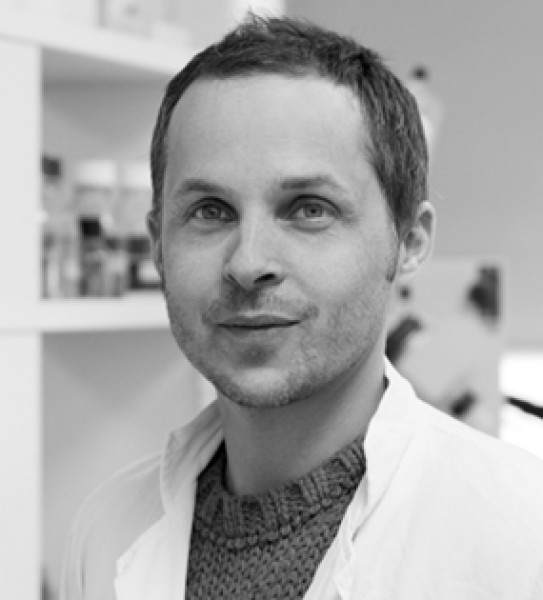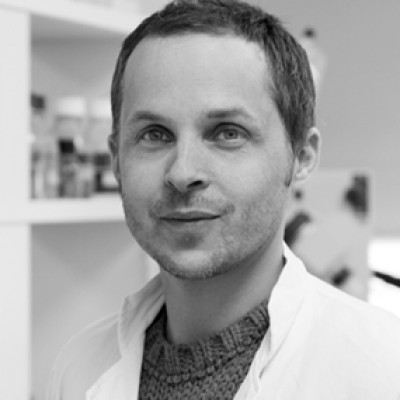Raphaël Rodriguez was born in 1978 in Avignon. He performed his PhD studies under the supervision of Prof Sir Jack E. Baldwin at the University of Oxford, where he completed the synthesis of structurally complex natural products by means of pericyclic processes. He joined The University of Cambridge in November 2005 as a postdoctoral fellow, working under the mentorship of Prof. Sir Shankar Balasubramanian, where his work led to the invention of the potent G-quadruplex targeting small molecule pyridostatin. In collaboration with Prof. Steve Jackson (Gurdon Institute, UK), he firmly established a link between G-quadruplex DNA structures and genomic instability. Raphaël joined the CNRS as a group leader in 2012 and was promoted Director of Research at Institut Curie in 2017. His recent achievements include the development of the anti-aging small molecule remodelin, the first chemical synthesis of the complex natural product marmycin and the iron metabolism targeting drug ironomycin. His group has recently elucidated the mechanism of action of salinomycin against cancer stem cells and identified a role of iron in the maintenance of these cells. The group has also provided evidence for a role of chromatin in regulating genome targeting with cisplatin.
Awards and Nominations
- Tetrahedron Young Investigateur Award (2018)
- Franco-British Young Leaders (2017)
- K2 Trophy in oncology (2017)
- Pierre Fabre Award for Therapeutic Innovation (2015)
- ERC Consolidator Award (2015)
- Emergence Ville de Paris Award (2015)
- Junior Scientists Participation Program 48th Bürgenstock Conference (2013)
- Fournier-SFC Prize (2006)
Recent publications
- Rodriguez et al. Chromatin regulates genome targeting with cisplatin. Angew. Chem. Int. Ed. DOI: 10.1002/anie.201701144R1
- Rodriguez et al. Salinomycin kills cancer stem cells by sequestering iron in lysosomes. Nature Chem. DOI: 10.1038/NCHEM.2778
- Rodriguez et al. Click quantitative mass spectrometry identifies PIWIL3 as a mechanistic target of RNA interference activator enoxacin in cancer cells. J. Am. Chem. Soc. 139, 1400-1403 (2017)
- Rodriguez et al. Synthesis of marmycin A and investigation into its cellular activity. Nature Chem. 7, 744-751 (2015)
- Rodriguez et al. Unravelling the genomic targets of small molecules using high-throughput sequencing. Nature Rev. Genet. 15, 783-796 (2014)
- Rodriguez et al. Chemical inhibition of NAT10 corrects defects of laminopathic cells. Science 344, 527-532 (2014)
- Rodriguez et al. Small molecule-induced DNA damage identifies alternative DNA structures in human genes. Nature Chem. Biol. 8, 301-310 (2012)
- Rodriguez et al. The transcription factor FOXM1 is a cellular target of the natural product thiostrepton. Nature Chem. 3, 725-731 (2011)
- Rodriguez et al. Small-molecule-mediated G-quadruplex isolation from human cells. Nature Chem. 2, 1095-1098 (2010). Highlight in F1000
- Rodriguez et al. A novel small molecule that alters shelterin integrity and triggers a DNA-damage response at telomeres. J. Am. Chem. Soc. 130, 15758-15759 (2008)









![[Podcast K2] Episode 03 - Raphaël Rodriguez - Oncologie - Cercle K2](https://cercle-k2.fr/storage/2347/conversions/774-medium.jpg)

![[Podcast K2] Episode 02 - Raphaël Rodriguez - Création - Cercle K2](https://cercle-k2.fr/storage/2345/conversions/772-medium.jpg)
![[Podcast K2] Episode 01 - Raphaël Rodriguez - Innovation - Cercle K2](https://cercle-k2.fr/storage/2346/conversions/773-medium.jpg)